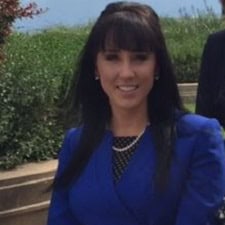
Kaytlin Roholt
2014 John Marshall Fellow
What is your current position?
I am serving as a law clerk to the Honorable Judge Richard J. Leon on the United States District Court for the District of Columbia.
What inspired you to choose this career path?
For as long as I can remember, I have been passionate about the sanctity of life, and I knew that I wanted to spend my career protecting life, from conception through natural death. This battle needs to be won on the policy side—through state and local political action—and on the legal side—through victories in our state and federal court systems. And there is no better way to learn the dos and don’ts of federal litigation than to work as a law clerk. Both of my clerkships have been incredible learning experiences, and I know that they have equipped me with skills that I will carry with me throughout the rest of my legal career.
How did you hear about the Claremont Institute?
I was vaguely familiar with the Claremont Institute during law school, but I was not aware of its fellowship opportunities. During my last year of law school, several friends and mentors of mine who had been through the John Marshall Fellowship encouraged me to apply. And they did not steer me wrong; the fellowship was incredibly helpful in preparing me for the federal appellate clerkship I was about to begin, and it was a breath of fresh air after three straight years of law school professors who largely rejected any conception of natural rights.
What’s your fondest memory of the Claremont Institute?
Our Second Amendment Day stands out as one of the most fun days of the Fellowship because we had the chance to put our Second Amendment rights to good use, which is not exactly easy to do now that I live in Washington, D.C. But the memories I cherish most fondly are the nights spent in the hospitality suite or at the pool discussing the topics of the day’s seminars. Even now, members of my John Marshall class get together for reunions in D.C., and these gatherings inevitably produce hilarious debates that would make any originalist, textualist, or natural law theorist proud.
There are all sorts of educational programs out there for current and rising conservative professionals. What do you think makes the Claremont Institute’s Fellowships unique?
The John Marshall Fellowship is perhaps most impactful in its consistent call to return to first principles. Rather than focusing on the issues of today and how we—as conservatives—can make a change, the John Marshall Fellowship challenged us to revisit our American history and assess how our founding principles should inform our intellectual thought. As someone who hadn’t studied American history since high school, I came away from the Fellowship with a newfound appreciation for our Founders and for The Federalist Papers.
If you could have a drink with an American Founder, or any great thinker, who would it be, why, and what would you order?
As a Catholic convert, I’d have to pick Saint Augustine. Having sampled—and rejected—so many schools of thought before ultimately finding himself in the Catholic Church, Saint Augustine would be a formidable intellectual sparring partner over a few drinks. And as his Confessions reveal, Saint Augustine discovered Christian virtue fairly late in life, so I can be sure that he knows how to have a good time. As for drinks, Saint Augustine seemed to love them all back in his day, but since he’s the patron saint of beer, it’s only appropriate that we throw back a few cold ones.
Who was more important for their time, George Washington or Abraham Lincoln? Why?
Henry Lee famously eulogized George Washington as “first in war, first in peace, and first in the hearts of his countrymen,” and Washington remains first in my heart as well. After all, there would have been no republic for Lincoln to save if Washington hadn’t created it.
What is the greatest challenge facing the United States today?
Tribalism from both sides. We’ve walled ourselves into safe spaces, and we’re more concerned about reacting negatively to those we don’t like than actively promulgating a pro-liberty agenda. That means we will often promote what’s useful rather than what’s true, or value what offends the other side rather than what forwards our cause.
What books are you reading right now?
I’m currently working my way through Kristin Lavransdatter by Sigrid Undset, which is a Norwegian trilogy about life in medieval—and newly Christianized—Norway. I’m also re-reading The Life of the Beloved by Father Henri J.M. Nouwen.
In addition to your law degree, you earned a Master’s in bioethics; how has bioethics influenced your law career?
As I mentioned, I decided to pursue law because I wanted to devote my career to the protection of human life, and my bioethical studies provided the perfect venue for studying the ethical considerations implicated by beginning of life and end of life care and decisionmaking. A student of bioethics must routinely ask himself what it means to be human and what it means to for those humans to be imbued with inherent dignity. These are fundamental questions about first principles, and as we push the boundaries in health care and the life sciences, it is crucial that the answers to these questions do not change. My bioethics degree also proved to be incredibly useful while working as Special Counsel to the Senate Judiciary Committee and advising the Chairman on the confirmation of Justice Gorsuch, who wrote his doctoral thesis (and a subsequent book) on euthanasia and physician-assisted suicide.

